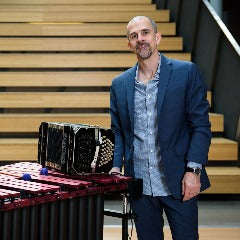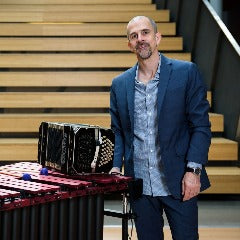As a former orchestra player it’s been a fun challenge to learn a new type of music and still utilize my sight reading skills. I love how we still utilize listening as there is no conductor, so listening is critical to stay in tempo and be musical together. I also have loved the opportunities I’ve had to practice soloing, a great skill transfer for jazz combos.
Ben definitely provided great feedback every class and I felt he did so in a way that pushed us as a group but still kept the class fun.
Ben in particular has been such a phenomenal instructor and I can confidently say each class we have with him makes me a better musician.
Ben is so approachable, so willing to work different angles when someone in the class is struggling to understand a concept. He regularly checks in on how we are doing and comprehending the material to ensure we can move forward. His always positive mood and bringing laughter into the course was so appreciated. He made theory fun and if there was ever a deeper dive Level 2 of this class I would want to take it.
The material was phenomenal, I'm newer to jazz but found this so helpful in learning how chords are constructed. I feel better equipped stepping into my first ever jazz ensemble in the Spring of this year if I'm able to be placed in one. I now feel that when I look at a jazz standard chord chart I understand much better what each of the chords are made up of and how to approach them on bass.
Ben and this class solidified that I'm at the right place at JNS to grow as a musician and better learn how to play jazz.
ONLINE Beginning Jazz Theory: The Language of Chord Symbols
This class will meet weekly on Mondays running January 12th to March 16th.
Beginning Jazz Theory: The Language of Chord Symbols is taught by one of the most experienced and fun teachers in the Pacific Northwest, Ben Thomas D.M.A. In this course, Ben examines the conventions and applications of the written musical language of chord symbols. It aims to establish a solid theoretical and aural foundation for students to build on and utilize in improvisation, interpretation, transcription, and composition.
Chord symbols are the primary way jazz musicians communicate complex musical ideas quickly and easily. Knowing your chord symbols can be the difference between spontaneously sitting in at a jam session and watching from the audience because you don’t know the tune.
Being able to interpret and realize chord symbols on your instrument opens up a whole new world of jazz and popular music. And you can learn how!
This class examines the conventions and applications of the written musical language of chord symbols. It aims to establish a solid theoretical and aural foundation for students to build on and utilize in improvisation, interpretation, transcription, and composition. All common chord symbol types up to and including 7ths will be covered in detail using intervals and sound rather than major and minor scale relationships.
At the conclusion of the class, students can expect to be able to:
- Major
- Minor
- Diminished
- Augmented
- Major 7th
- Minor 7th
- Dominant 7th
- Half-diminished 7th
- Diminished 7th
“Chord symbol spelling is highly idiosyncratic and highly contentious. Everyone wants to believe that their preferred method of spelling chords is the One True Way. In reality, what is considered correct is determined by consensus within communities, not by the strict application of rules. That said, there are practical reasons to prefer chord symbols that are concise, compact, consistent, unambiguous, and visually distinct from one another.”
- Darcy James Argue
Homework: Optional homework is given each week related to class content.
Student Requirements: Punctual attendance and desire to learn and improve. Students supply their instruments.
This is a 10 week course meeting online once a week for 90 minutes.
Prior assessment for, or previous enrollment in, a level 1, 2, or 3 combo.
Beginning, intermediate, or advanced
Jazz Night School is a vibrant and welcoming community-based nonprofit music education program that is home to hundreds of like-minded learners. Our school offers great opportunities to meet other dedicated jazz students and artists. Whatever your skill level, we have a place for you.
Schedule a skills assessment
We strongly encourage all new students to schedule a complimentary skills assessment so we can help you figure out the best place to start.
What is it like to learn with us?
As a student at Jazz Night School, you'll be part of a friendly, supportive community that shares a love and deep appreciation for jazz music in all its various forms. Your development as a musician is our primary educational goal. Whatever your skill level, our program can help you improve your musicianship and discover your own unique musical voice. For new students, we provide a complimentary introductory session that includes a skills assessment. This session gives you a chance to share your goals and interests and helps us point you to the most appropriate offerings. Each quarter we offer a wide variety of classes and workshops on improvisation, harmony, ear-training, and specialized topics. Our online classes feature lots of discussion and opportunity for questions and answers. There are no grades at Jazz Night School; rather, instructors give each student individual feedback on an ongoing basis. Everyone's effort is valued. When public health restrictions are relaxed, we will return to offering group ensemble opportunities that culminate in a short performance at a local nightclub. This is a fun-filled evening where friends and family come to applaud student efforts and cheer them on to new heights of musical expression!
We understand that most of our students have important life commitments such as work and family. There may be days that you have to deal with a sick child or a pressing work deadline and you aren't able to put in as much practice time as you would have liked. We get it. Our goal is to support your musical aspirations at whatever pace you are able to sustain at this time in your life.
Instructors
Jazz Night School instructors are some of the finest musicians and educators in Seattle’s vibrant jazz community. Some have learned their art through old school traditions and others have studied at premier institutions such as Berklee College of Music, Eastman, Indiana University, Manhattan School of Music, New England Conservatory, and University of Miami.
All Jazz Night School policies must be adhered to for enrollment, policies can be found here.



